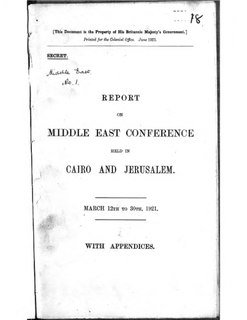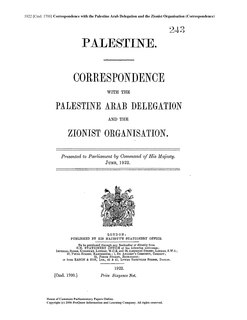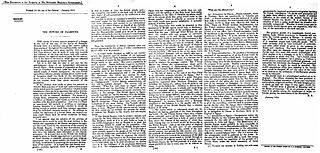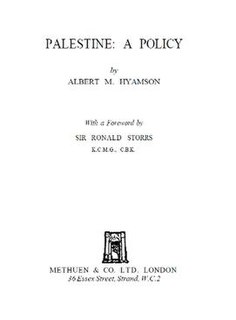 W
WMandatory Palestine was a geopolitical entity established between 1920 and 1948 in the region of Palestine under the terms of the League of Nations Mandate for Palestine.
 W
WThe Mandate for Palestine was a League of Nations mandate for British administration of the territories of Palestine and Transjordan, both of which had been conceded by the Ottoman Empire following the end of World War I in 1918. The mandate was assigned to Britain by the San Remo conference in April 1920, after France's concession in the 1918 Clemenceau–Lloyd George Agreement of the previously-agreed "international administration" of Palestine under the Sykes–Picot Agreement. Transjordan was added to the mandate after the Arab Kingdom in Damascus was toppled by the French in the Franco-Syrian War. Civil administration began in Palestine and Transjordan in July 1920 and April 1921, respectively, and the mandate was in force from 29 September 1923 to 15 May 1948.
 W
WThe 6th Airborne Division in Palestine was initially posted to the region as the Imperial Strategic Reserve. It was envisioned as a mobile peace keeping force, positioned to be able to respond quickly to any area of the British Empire. In fact the division became involved in an internal security role between 1945 and 1948.
 W
WThe Clemenceau–Lloyd George Agreement of 1 December 1918 was a verbal agreement which modified the 1916 Sykes–Picot Agreement in respect to Palestine and the Mosul Vilayet. The latter component is also known as the Mosul cession. The agreement was between British and French Prime Ministers David Lloyd George and Georges Clemenceau, and took place at the French Embassy in London.
 W
WThe Arab College in Jerusalem was secondary school in British Mandatory Palestine. The Arab College lasted from 1918 until 1948, when it was swept away in the 1948 Arab–Israeli War. The British administration began an education system in the former Ottoman lands which consisted of primary schools in the largest towns and a boarding secondary school, the Government Arab College, in Jerusalem. The chief role of the Arab College was to train teachers for the primary schools, which were gradually being added to smaller towns and villages. For a time its principal was the influential Ahmad Samih Khalidi, father of Walid Khalidi and Tarif Khalidi. By the time of its demise, the Arab College had become the most prestigious school for Arab students in Palestine. The buildings were used as UN headquarters for a few years after the war.
 W
WBayt Jibrin, was a Palestinian village located 21 kilometers (13 mi) northwest of the city of Hebron. The village had a total land area of 56,185 dunams or 56.1 km2, of which 0.28 km2 were built-up while the rest remained farmland.
 W
WThe 1921 Cairo Conference, described in the official minutes as Middle East Conference held in Cairo and Jerusalem, March 12 to 30, 1921, was a series of meetings by British officials for examining and discussing Middle Eastern problems, and to frame a common policy. The secret conference of British experts created the blueprint for British control in both Iraq and Transjordan. By offering nominal leadership of those two regions to the sons of the Sharif of the Mecca, Churchill felt that the spirit if not the actual letter of Britain's wartime promises to the Arabs were fulfilled.
 W
WLieutenant Colonel Sir John Robert Chancellor was a British soldier and colonial official.
 W
WThe Churchill White Paper of 3 June 1922 was drafted at the request of Winston Churchill, Secretary of State for the Colonies, partly in response to the 1921 Jaffa Riots. While maintaining Britain's commitment to the Balfour Declaration and its promise of a Jewish national home in Palestine, the paper emphasized that the establishment of a national home would not impose a Jewish nationality on the Arab inhabitants of Palestine. To reduce tensions between the Arabs and Jews in Palestine the paper called for a limitation of Jewish immigration to the economic capacity of the country to absorb new arrivals. This limitation was considered a great setback to many in the Zionist movement, though it acknowledged that the Jews should be able to increase their numbers by immigration as of right and not on sufferance.
 W
WThe Concessions in Mandatory Palestine were a number of monopolies for the operation of key economic assets in Mandatory Palestine.
 W
WThe Constitution of Mandatory Palestine, formally known as the 10 August 1922 Palestine Order-in-Council, was the codified constitution of Mandatory Palestine. It was first published on 1 September 1922 in an Extraordinary Issue of the Palestine Gazette.
 W
WThe Districts and Sub-districts of Mandatory Palestine formed the first and second levels of administrative division and existed through the whole era of Mandatory Palestine, namely from 1920 to 1948. The number and territorial extent of the districts varied over time, as did their subdivision into sub-districts.
 W
WDouglas Valder Duff DSC was a British merchant seaman, Royal Navy officer, police officer, and author of over 100 books, including memoirs and books for children.
 W
WFrom Dan to Beersheba is a biblical phrase used nine times in the Hebrew Bible to refer to the settled areas of the Tribes of Israel between Dan in the North and Beersheba in the South. The term contributed to the position that was used by British politicians during negotiation of the British Mandate for Palestine following World War I.
 W
WThe High Commissioner for Palestine was the highest ranking authority representing the United Kingdom in the mandated territories of Palestine and the High Commissioner for Transjordan was the highest ranking authority representing the United Kingdom in Transjordan. These posts were always held simultaneously by a single individual after the High Commissioner for Transjordan was established in 1928.
 W
WHoratio Herbert Kitchener, 1st Earl Kitchener was an Irish-born senior British Army officer and colonial administrator who won notoriety for his imperial campaigns, most especially his scorched earth policy against the Boers and his expansion of Lord Roberts' internment camps during the Second Boer War and later played a central role in the early part of the First World War.
 W
WSamuel Klein was a Hungarian-born rabbi, historian and historical geographer in Mandatory Palestine.
 W
WThe London Conference (1939), or St James's Palace Conference, which took place between 7 February-17 March 1939, was called by the British Government to plan the future governance of Palestine and an end of the Mandate. It opened on 7 February 1939 in St James's Palace after which the Colonial Secretary, Malcolm MacDonald held a series of separate meetings with an Arab and a Jewish delegation, because the Arab delegation refused to sit in the same room as the Jewish delegation. When MacDonald first announced the proposed conference he made clear that if no agreement was reached the government would impose a solution. The process came to an end after five and a half weeks with the British announcing proposals which were later published as the 1939 White Paper.
 W
WThe London Conference of 1946–1947, which took place between September 1946 and February 1947, was called by the British Government of Clement Attlee to resolve the future governance of Palestine and negotiate an end of the Mandate. It was scheduled following an Arab request after the April 1946 Anglo-American Committee of Inquiry report.
 W
WThe Kirkuk–Haifa oil pipeline was a crude oil pipeline from the oil fields in Kirkuk, located in the former Ottoman vilayet of Mosul in northern Iraq, through Transjordan to Haifa in mandatory Palestine. The pipeline was operational between 1935 and 1948. Its length was about 942 kilometres (585 mi), with a diameter of 12 inches (300 mm), and it took about 10 days for crude oil to travel the full length of the line. The oil arriving in Haifa was distilled in the Haifa refineries, stored in tanks, and then put in tankers for shipment to Europe.
 W
WSS Ocean Vigour was a British Ocean class freighter, which served on various convoys during World War II, and then as a troopship before being used to deport illegal Jewish immigrants who attempted to enter Mandate Palestine to internment camps in Cyprus. She took part in the return of immigrants from the SS Exodus back to Europe, before being sold into commercial service. She was scrapped in 1967.
 W
WThe Palestine pound (Arabic: جُنَيْه فِلَسْطَينِيّ, junayh filastini; Hebrew: (פוּנְט פַּלֶשְׂתִינָאִי (א״י, funt palestina'i , also (לירה was the currency of the British Mandate of Palestine from 1 November 1927 to 14 May 1948, and of the State of Israel between 15 May 1948, and 23 June 1952, when it was replaced with the Israeli lira or pound. The Palestine pound was also the currency of Transjordan until 1949 when it was replaced by the Jordanian dinar, and remained in usage in the West Bank of Jordan until 1950. In the Gaza Strip, the Palestine pound continued to circulate until April 1951, when it was replaced by the Egyptian pound.
 W
WThe Future of Palestine, also known as the Samuel memorandum, was a memorandum circulated by Herbert Samuel to the British Cabinet in January and March 1915, two months after the British declaration of war on the Ottoman Empire.
 W
WPalestine: A Policy is a history book by British civil servant and historian, Albert Montefiore Hyamson, which provides a history of the idea and practise of Zionism from the Eighteenth Century and the British Mandate for Palestine until 1942.
 W
WMandatory Palestine passports were travel documents issued by British authorities in Mandatory Palestine to residents between 1925 and 1948. The first brown-covered passport appeared around 1927, following the issue of the Palestinian Citizenship Order, 1925. From 1926 to 1935 alone approximately 70,000 of such travel documents were issued.
 W
WField Marshal Herbert Charles Onslow Plumer, 1st Viscount Plumer, was a senior British Army officer of the First World War. After commanding V Corps at the Second Battle of Ypres in April 1915, he took command of the Second Army in May 1915 and in June 1917 won an overwhelming victory over the German Army at the Battle of Messines, which started with the simultaneous explosion of a series of mines placed by the Royal Engineers' tunnelling companies beneath German lines, which created 19 large craters and was described as the loudest explosion in human history. He later served as Commander-in-Chief of the British Army of the Rhine and then as Governor of Malta before becoming High Commissioner of the British Mandate for Palestine in 1925 and retiring in 1928.
 W
WThe Public Seal of Mandatory Palestine was a crown with the words "Palestine High Commissioner" underneath.
 W
WSt Andrew's Church, also known as the Scots Memorial Church, is a church in Jerusalem built as a memorial to the Scottish soldiers who were killed fighting the Turkish Army during World War I, bringing to an end Ottoman rule over Palestine. It is a congregation of the Church of Scotland.
 W
WMuseum of Underground Prisoners is a museum in Jerusalem, Israel, commemorating the activity of the Jewish underground—Haganah, Irgun and Lehi—during the period leading up the establishment of the State of Israel.
 W
WTower and Stockade was a settlement method used by Zionist settlers in Mandatory Palestine during the 1936–39 Arab Revolt. The establishment of new Jewish settlements was legally restricted by the Mandatory authorities, but the British generally gave their tacit accord to the Tower and Stockade actions as a means of countering the Arab revolt. During the course of the Tower and Stockade campaign, some 57 Jewish settlements including 52 kibbutzim and several moshavim were established throughout the country. The legal base was a Turkish Ottoman law that was in effect during the Mandate period, which stated that no illegal building may be demolished if the roof has been completed.
 W
WThe White Paper of 1939 was a policy paper issued by the British government, led by Neville Chamberlain, in response to the 1936–1939 Arab revolt in Palestine. After its formal approval in the House of Commons on 23 May 1939, it acted as the governing policy for Mandatory Palestine from 1939 to the 1948 British departure. After the war, the Mandate was referred to the United Nations.
 W
W W
W